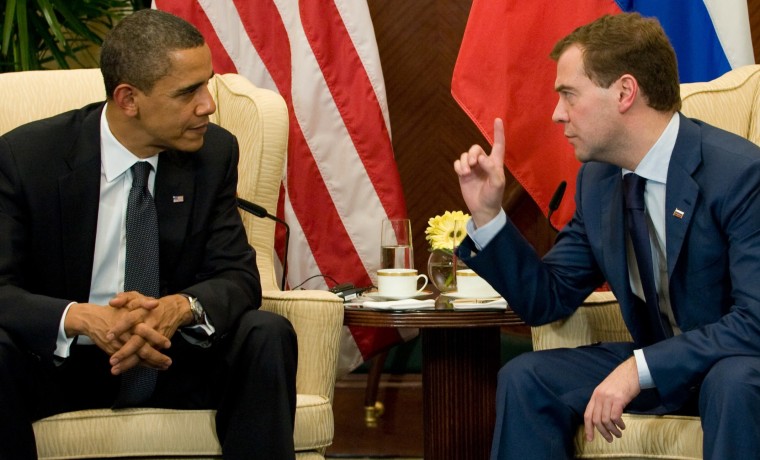President Barack Obama on Sunday said the United States and Russia would have a replacement treaty on reducing nuclear arms in place by the end of the year, an announcement designed as an upbeat ending to a summit with Asia-Pacific leaders.
While trumpeting progress with Russia on arms control — part of Obama's determination to put the world on a path toward nuclear disarmament — it became obvious that a 192-nation gathering next month in Copenhagen was not going to produce a new global treaty to reduce heat-trapping carbon emissions to roll back warming of the planet.
Nearing the end of his two days in Singapore, Obama also attended a second summit with leaders of the 10 southeast Asian countries that make up the ASEAN group. Obama was the first U.S. president to sit in on the meetings, that included the leader of Myanmar.
Afterward, White House spokesman Robert Gibbs said Obama told Gen. Thein Sein, leader of the military junta ruling the country, that he must free democracy leader and Nobel laureate Aung San Suu Kyi and other political prisoners.
Obama "brought that up directly with that government," Gibbs said.
Suu Kyi has been in detention for 14 of the last 20 years.
While Myanmar ranks high among nations that suppress human rights, a joint statement by the United States and the ASEAN group made no mention of Suu Kyi.
The Obama administration recently shifted policy on Myanmar, seeking to engage the military rulers there while keeping in place punishing sanctions.
Obama and Russian President Dmitry Medvedev met on the sidelines of the Asia-Pacific summit of APEC nations to announced good progress in negotiations on an updated pact to replace the START nuclear arms agreement that expires on Dec. 5.
'Sense of urgency'
Sitting, gesturing and leaning toward his Russian counterpart, Obama said the pair discussed a successor to the 1991 Strategic Arms Reduction Treaty and described "excellent progress over the last several months."
"I'm confident that if we work hard and with a sense of urgency, we'll be able to get that done," Obama said, adding technical issues remain.
Medvedev said he hoped negotiators would "finalize the text of the document by December."
Obama and Medvedev agreed in April to reach a new nuclear arms reduction pact to replace and expand upon the one that was signed by former President George H.W. Bush and Soviet leader Michael Gorbachev.
During a July summit in Moscow, Obama and Medvedev further agreed to cut the number of nuclear warheads each nation possesses to between 1,500 and 1,675 within seven years.
U.S. officials say the two nations now have agreed on the broad outlines of a new treaty, which could be signed during Obama's travels to Europe in early December to accept the Nobel Peace Prize.
It still was not clear if Obama would use that same trip to attend the Copenhagen climate summit, given that any agreement reached on cutting greenhouse gas emissions would serve only as an interim, political document.
"There was an assessment by the leaders that it is unrealistic to expect a full internationally, legally binding agreement could be negotiated between now and Copenhagen which starts in 22 days," said Michael Froman, Obama's deputy national security adviser for international economic matters.
The prime minister of Denmark, Lars Loekke Rasmussen, the U.N.-sponsored climate conference's chairman, flew overnight to Singapore to present a proposal shifting the goal of the meeting to a "politically binding" agreement, in hopes of breathing life into the struggling process.
A fully binding legal agreement would be left to a second meeting next year in Mexico City, Froman said.
Obama backed the approach, cautioning the group not to let the "perfect be the enemy of the good," Froman said.
A major bill dealing with energy and climate in the U.S. Senate, a domestic priority of Obama's, is bogged down with scant hope of completion by next month. That would leave Obama little to show in Copenhagen.
During his Asia trip, which continued later Sunday to China, Obama also pushed for continued pressure on Iran and its nuclear program. Appearing with Medvedev, Obama said "we are now running out of time."
"Unfortunately, so far it appears Iran has been unable to say yes," to the proposal on uranium reprocessing, Obama said.
Medvedev continued: "We are prepared to work further and I hope our joint work will reach a positive result. In case we fail, other options remain on the table." He has said further sanctions against Iran were possible if it did not open its nuclear program to inspections to prove it was not trying to build a bomb.
The five permanent members of the U.N. Security Council — the U.S., Britain, France, Russia and China — along with Germany have engaged Iran on its nuclear program, most recently with a deal for it to ship enriched uranium to Russia for further processing as fuel for an aging reactor used for medical treatments.
The United States and its allies believe Iran is using it's nuclear program as a cover for building a bomb. Tehran says it only wants to build nuclear reactors to generate electricity.
